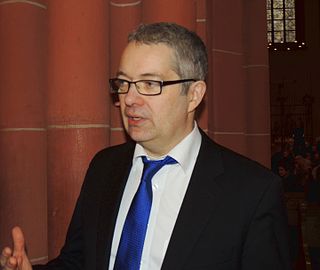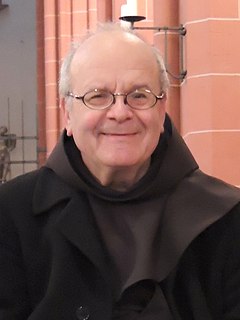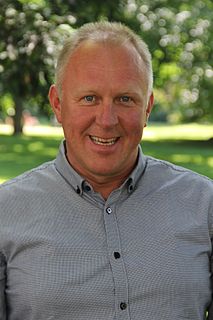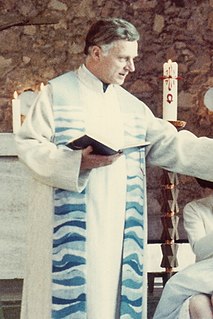Related Research Articles

Peter Reulein is a German composer, organ improviser, academic teacher and church musician, from 2000 at the church Liebfrauen in Frankfurt am Main. In 2016 he composed for the Catholic Diocese of Limburg the Franciscan oratorio Laudato si'.

Helmut Alfons Schlegel is a German Franciscan, Catholic priest, meditation instructor, author, librettist and songwriter. He is known for writing new spiritual songs, set to music by various composers.

Neues Geistliches Lied, abbreviated NGL, is a music genre of songs in German intended for church usage, and based on contemporary lyrics and with music by contemporary composers.

Eugen Eckert is a German social worker, minister, singer-songwriter and academic teacher. He is known for his lyrics for new spiritual songs, and his oratorios and musical plays.

Patrick Dehm is a German Catholic theologian, supervisor and clinical Gestalt therapist. He and his brother founded the Eugen Dehm foundation, supporting a holistic health concept, in memory of their father.
Joachim Raabe is a German church musician and a composer of sacred music, especially of the genre Neues Geistliches Lied.
inTAKT is a German ecumenical association (Verein) for the promotion of new Christian songs for church services, and of art, culture and musical education. Its members are mostly hymnwriters and composers interested in NGL.

"Glauben können wie du" is a Christian poem by Helmut Schlegel, written in 2009, and made a hymn of the genre Neues Geistliches Lied with a melody by Joachim Raabe the same year. It addresses Mary, the mother of Jesus, to be imitated living the theological virtues of faith, hope and love. The song is included in song books and the Catholic hymnal Gotteslob.

"Gott, der du warst und bist und bleibst" is a Christian hymn with text by Eugen Eckert and a melody by Herbert Heine. It is also known by the title of its refrain, "Wir haben hier keine bleibende Stadt". The song was written in 1993, in the genre Neues Geistliches Lied (NGL). It appears in several regional sections of the German Catholic hymnal Gotteslob, and in other songbooks.

"Seht, er lebt" is a Christian poem written by the Catholic priest Lothar Zenetti in 1973. With an Israeli melody, it became an Easter hymn in the Neues Geistliches Lied (NGL) genre, first published in 1975. In the 2013 Catholic hymnal Gotteslob, it appears as GL 781 in the regional section for the Diocese of Limburg.

"Meine engen Grenzen" is a Christian poem by Eugen Eckert, written in 1981, and made a hymn of the genre Neues Geistliches Lied with a melody and setting by Winfried Heurich the same year. The song, bringing one's shortcomings and limitations before God and praying for a broader perspective, is part of the common German Protestant and Catholic hymnals, and of other songbooks.

"Lamm Gottes, für uns gegeben" is a Christian hymn in German with text by Eugen Eckert and a tune by Horst Christill. It is of the genre Neues Geistliches Lied. The song reflects the liturgical Agnus Dei. It is part of regional sections of the common German Catholic hymnal.
Christoph Lehmann is a German organist, harpsichordist, church musician and composer, especially in the field of Neues Geistliches Lied (NGL). He has worked as a continuo harpsichordist and organist in performances and recordings of Early music with several ensembles.
"Hilf, Herr meines Lebens" is a Christian hymn, with a text mostly written in 1961 by Gustav Lohmann, and a melody composed the following year by Hans Puls. The song, of the genre Neues Geistliches Lied (NGL), is part of German hymnals, including Gotteslob, and songbooks. It begins: "Hilf, Herr meines Lebens, dass ich nicht vergebens hier auf Erden bin".

"Gott hat mir längst einen Engel gesandt" is a 1996 Christian song with text by Eugen Eckert, set for a four-part choir by Thomas Gabriel as part of the rock oratorio Daniel. It became a hymn of the genre Neues Geistliches Lied, which is contained in several hymnals and songbooks.
Habakuk is a German pop band from Frankfurt, formed in 1975. The group is focused on new Christian music of the genre Neues Geistliches Lied.

"Nahe wollt der Herr uns sein" is a Christian hymn with German text, translated in 1971 from a 1964 Dutch hymn by Huub Oosterhuis. Its refrain says that God is among people but not recognised. The song, of the genre Neues Geistliches Lied (NGL), appeared from 1975 in German hymnals, then in the common section of the Catholic Gotteslob. In the hymnal's second edition, it appeared only in regional sections.

"Bewahre uns, Gott" is a Christian hymn with text by Eugen Eckert to a melody from Argentina, of "La paz del Señor". The song of the genre Neues Geistliches Lied, a prayer for protection in hard times, is contained in several hymnals and songbooks ecumenically. Several of these list it as "Bewahre uns, Gott, behüte uns, Gott"

"Jesus Christus, Menschensohn" is a Christian hymn by Helmut Schlegel. It is a song of the genre of Neues Geistliches Lied, with a melody by Helmut Föller. The refrain is "Kyrie eleison". The song is included in song books and the Catholic hymnal Gotteslob.
"Segne, Vater, diese Gaben" is a Christian hymn. The authors of text and melody are unknown. It is meant to be sung as a round. The song, which is often used for a prayer before a meal, has appeared in German hymnals and songbooks. It is regarded as a song of the genre Neues Geistliches Lied (NGL), and has been used in schools and events for young people.
References
- ↑ "Auf dem Weg durch diese Nacht". evangeliums.net (in German). Retrieved 22 May 2022.
- ↑ "CD NachKlänge / Musikalische Abendgebete" (in German). Dehm-Verlag. 2006. Retrieved 7 June 2022.
- ↑ "Jetzt" (in German). Habakuk. 2017. Retrieved 29 May 2022.
- 1 2 3 "Chorbücher" (in German). Dehm-Verlag. 2021. Retrieved 22 May 2022.
- 1 2 Schröder, Johannes (2021). Evensong (PDF). Kirchenmusik im Erzbistum Köln (in German). Diocese of Cologne. pp. 16–19. Retrieved 27 June 2022.
- 1 2 "Auf dem Weg durch diese Nacht" (PDF) (in German). Diocese of Cologne. February 2021. Retrieved 29 May 2022.
- 1 2 Leschke, Tobias (16 September 2021). "Auf dem Weg durch diese Nacht". Klangraum Kirche (in German). Diocese of Paderborn . Retrieved 29 May 2022.
- ↑ "Das Bistum Limburg beim Katholikentag / Großes Fest des Glaubens in Stuttgart" (in German). Diocese of Limburg. May 2022. Retrieved 27 June 2022.